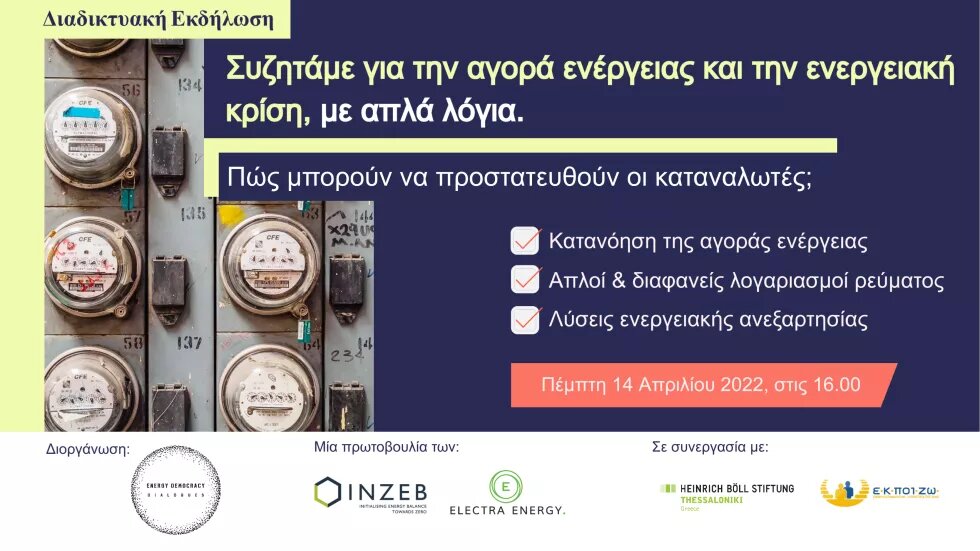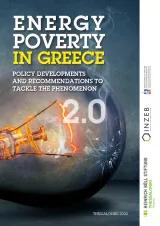While all citizens are experiencing the energy crisis so intensely, the energy market remains something unknown, complex and incomprehensible. Starting from this paradoxical phenomenon, the very interesting online event "Discussing the energy market and the energy crisis in simple terms. How can consumers be protected?", provided a comprehensive and informative presentation of the electricity market, which exposed the problems and their causes but also proceeded to formulate solutions and proposals.

The event was co-organised by INZEB and Electra Energy coop in cooperation with the Heinrich Böll Foundation Thessaloniki Office - Greece and the Consumers' Association - Quality of Life (EKPOIZO) in the framework of the Energy Democracy Dialogues initiative. It was attended by a large number of people who actively participated with meaningful and quality questions.
The new energy market model
The keynote speaker was Dimitris Kardomateas, energy consultant and former General Manager of Strategy & Development of DESFA, who stated that the problems in the energy market, such as the skyrocketing increases, are not a temporary crisis but are a new reality after the change of the market model, which favors variable prices. The main problems, he said, are the significant dependence of electricity generation on gas, the fact that the price of energy is determined by the stock exchange and therefore becomes victim of "market psychology" and other arbitrary factors, and the fact that Greece is the only country that covers 100% of its needs through the stock exchange, ignoring the solution of bilateral agreements. He clarified that the energy transition is not only not responsible for the crisis, but on the contrary is part of the solution, as the more the renewable energy sources are expanded, the more the use of natural gas for electricity generation will be reduced. Other solutions, unfortunately in the medium term, include energy savings, the expansion of wind and photovoltaic power and the maximisation of hydroelectric power, self-production from renewable energy sources, either through net metering or through energy communities, a cap on stock exchanges, standard bills and standard contracts. [More in the article by Dimitris Kardomateas on the website of the Heinrich Böll Foundation, Thessaloniki office (currently only available in Greek)]
Huge distortions
The President of EKPIZO Panagiota Kalapotharakou described the situation in the energy market as highly irregular and spoke of huge distortions at all levels. She said that a generation of electricity debts is being created and announced collective actions and injunctions in defense of consumers. For her part, Vicky Tzega, legal advisor of EKPIZO, spoke of a very large number of complaints from citizens and identified problems such as opaque charges due to the indexation clause, non-compliance with legislation, -illegal- unilateral modifications from fixed to variable rates, misleading and unfair practices. She referred in particular to the organisation's campaign for 'clean electricity bills', which must be simple, understandable, comprehensive and transparent.
Citizen awareness and self-production
Ignacio Navarro from Greenpeace Greece presented a recent survey by the organisation on the energy landscape in Greece, which showed how little informed citizens are, who nevertheless in large percentages want energy savings, renewable energy sources, action by the state and of course information and education. More about the survey can be found here (in Greek). See also at the end of the article.
Dimitris Kitsikopoulos from Electra Energy Coop referred in particular to self-production as one of the solutions to get out of the energy exchange, and especially to consumers becoming members of an energy community, as it is not always feasible to place a photovoltaic on the roof of one's apartment building.
Alice Corovessi, Director General of INZEB, stressed that both Europe and Greece in particular have an ageing building stock that favors high energy consumption, so the priority should be to upgrade the energy efficiency of buildings.
Energy as a basic right
Kyriaki Metaxa, programe coordinator at the Heinrich Böll Foundation Greece, referred to the call for energy to be institutionalised as a basic right, like water. As she stressed, energy is no longer a luxury service that provides a higher standard of living, but a basic good, the absence of which can exclude people from participating in life. Finally, Michael Goudis, director of the Heinrich Böll Foundation, stressed that the increased public interest in the event shows how abruptly and violently the energy problem has emerged and that the time has come for the term energy democracy to enter the debate for good.
The discussion was moderated by journalist Yannis-Orestis Papadimitriou of Manifold [See also the article "Who is to blame for energy prices in Greece?" in Reporters United (in Greek)].
A full wrap-up of the event, including speakers’ presentations can be found here (in Greek).
Watch the video of the event with English subtitles.


